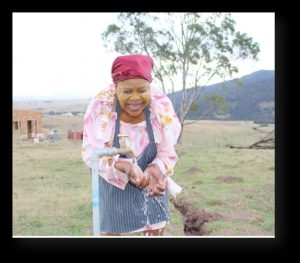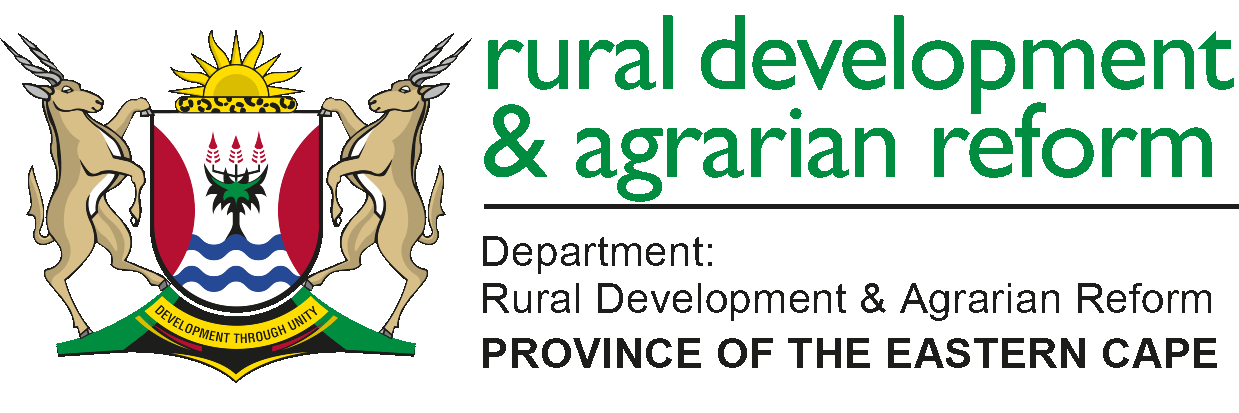
SPRING WATER PROTECTION CHANGING LIVES
The Eastern Cape Department of Rural Development and Agrarian Reform’s Rural Appropriate Technology Unit (RATU) has brought about the much-needed change in the lives of many in the province by providing them with fresh water at within a stone’s throw distance. The project sources water from perennial uphill springs by first protecting them from both animals, dirt and siltation and then channel the water to strategically located communal taps for easy access and use by households.
The provision of the precious resources hasn’t only fulfilled the Constitutional right of access to water by citizens, but it has also seen the resuscitation of agricultural co-ops in areas like Gobhoti Village under the Engcobo Local Municipality, while in Hlangalani Village in Elundini Local Municipality many have gone back to their old ways of growing crops in their gardens to sustain their livelihoods. In Gobhoti Village (Ward 9), the spring water project saw 15 communal taps being installed in the area. Other residents have gone as far as drawing water from the main pipeline to their homes for easy access.
A senior resident in the village, Mzimasi Sotyato, who is also a chairperson of Lubumbano Farming Secondary Coop said since the installation of the piped water at least 11 coops that some had closed shop and others at the brink of collapse as a result of limited access to water had return to their full operations. “Coops are mushrooming left, right and center because people aren’t lazy to work the land and provide for themselves, but the issues are minor things like access to water. Since we had water in the area a lot has changed with regards to farming, even the pain of having to walk long uphill distances to fetch water is the thing of the past. Now that we have water we’d really appreciate it the department behind this can push more people to working their gardens by assisting with seedlings because people in the area are really struggling to make ends meet,” said the 70-yearold.
A local Ghoboti Junior Secondary School has also benefited from the project. Before the spring water project came into effect in Hlangalani Village in the Alfred Nzo District, residents depended on a stream located far away from the residential area. According to a resident, Oliver Gxilishe (47) the exercise of fetching water in the bushy river had made women and children targets of attacks and abuse. “Before we had water taps installed in our village we, men, had to act as guards and look after our women and children when they went to fetch water and do laundry in the river. We’d let them go on their own but in the afternoon we’d have to abandon our livestock and go sit with them up until they were through with whatever they were doing and then walk them back to the houses,” he said. Gxilishe is among those who has since gone back to work his garden after having access to water to irrigate his crops. “In my garden I plan vegetables in the form of cabbage, spinach, beetroot and carrot so I can provide healthy food for my family. The initiative has really assisted us,” said Gxilishe. The provision of water to these areas will also assist in the fight against the deadly coronavirus as one of the protective measures include washing water regularly.
According to a StatsSA report titled: “Towards measuring food security in South Africa: An examination of hunger and food inadequacy” the involvement of households in agricultural activities for subsistence farming can play an important role in reducing the vulnerability to hunger of rural and urban food-insecure households. The results show that out of 16, 2 million households, about 2,5 million households (15,6%) were involved in agricultural activities in South Africa in 2017.
“Provinces that are predominantly rural and with high levels of poverty such as Limpopo (25%), Eastern Cape (20%) and KwaZulu-Natal (20%) had the highest proportions of households that relied on agricultural activities to supply their own food. Most households involved in agricultural activities were involved in the production of fruits and vegetables, grain and other food crops, as well as in livestock and poultry farming.” The StatsSA General Household Survey Report of 2018 households will access to tap water inside their dwellings, off-site or on-site was most common among households in Western Cape (98, 7%), Gauteng (97, 1%), and Northern Cape (95,3%) and least common in Eastern Cape (75,1%) and Limpopo (74,1%).
Some of the positive outcomes derived from the implementation of spring protection include skills transfer to unskilled, poor community members as they were trained on water pipe-laying, backfilling, spring protection and maintenance; access to basic infrastructure and basic water for rural residents; job creation as local members were hired in project implementation; improved the livelihoods of the employed (albeit temporarily) as they were accordingly remunerated. Among those who also benefitted from the project through skills transference is self-employed bricklayer Gxilishe. Speaking of the skills transfer, he said: “I am a full package! I can also do pipe laying and fitting as I worked in the project as a pipe fitter. This is a skill I have always wanted because I want to build houses and do plumbing myself. And even when the pipe bursts in some areas I believe I will be the first person the implementing agent of the project will send to inspect the affected area and possible the amount of work that needs to be done,” he said.
Other spring water protection projects include Spring Protection in Hoyita, Sterkspruit, Senqu LM Xanase Village in Mbhase Local Municipality Goxe Spring Protection in Mzimvumbu Local Municipality Matyeni Spring Protection in Mzimvubu Local Municipality Gobhoti Spring Protection in Engcobo Local Muncipality.

